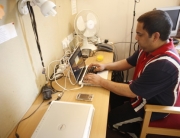Online surveillance is the monitoring of data stored on hard drives or servers, computer activity, or data transfers over the Internet or other computer networks. This type of monitoring is done both legally and illegally by individuals, governments, and corporations. Online surveillance programs are becoming increasingly common.
Many governments see online surveillance as a way monitor threats, prevent or investigate crime, and increase national security. However, many individuals, civil liberties groups, and some governments, who are the target of online surveillance, feel the unprecedented ability to monitor online and computer activities is a major threat.
The issue of online surveillance was a major topic of conversation and debate in 2013 when American computer specialist and former Central Intelligence Agency employee – Edward Snowden – stole a number of classified documents and leaked them to several media outlets. The documents revealed the details of a global online surveillance program run by the American National Security Agency (NSA) and the Five Eyes Security Alliance (US, UK, Australia, New Zealand, Canada).
A BBC article that explains how online surveillance can occur and how data is gathered:
http://www.bbc.co.uk/news/world-us-canada-24717495
1. Background
Surveillance in the UK
The GCHQ (Government Communications Headquarters) is the UK spy agency that is dedicated to intelligence and information gathering, and is the UK’s equivalent to the NSA. The GCHQ states that it abides by UK law in its operations, including the Human Rights Act, and only searches for data when they have reason to do so, mainly targeting criminals and terrorists within the UK. On 21 June 2013, the Guardian reported that GCHQ had data interceptors on fibre-optic cables that carry internet data to and from the UK with locations across Europe and the US. This allows the GCHQ to directly access large amounts of global internet data as part of a program, called Tempora. Further details of the GCHQ can be found in the following WiredUK article:
http://www.wired.co.uk/news/archive/2013-06/24/gchq-tempora-101
The Guardian’s report on GCHQ:
http://www.theguardian.com/uk/2013/jun/21/gchq-cables-secret-world-communications-nsa
A Parliament evidence session was held in November 2013 to provide insight into the workings of UK intelligence, and act as a step forward in the openness and transparency of UK intelligence agencies. Details of the hearing can be found at:
http://www.parliament.uk/business/news/2013/november-/isc-open-evidence-session/
An article from the Guardian (October 2013) outlining the GCHQ’s legal challenges in facing the European Court on privacy and data protection rights:
http://www.theguardian.com/uk-news/2013/oct/03/gchq-legal-challenge-europe-privacy-surveillance
Open Rights Group (ORG) is the UK’s leading organisation in online rights, including data protection and privacy. Their website can be found at:
https://www.openrightsgroup.org/about/
Surveillance in the EU
In July 2013, the European Commission (EC) held a debate regarding the U.S. surveillance activities, headed by Vice-President Reding. She suggested that in order to protect and commit to high data protection standards, member EU states should adopt the Commission’s data protection reform for the private and public sector. Further highlights and details of the debate can be found on Vivian Reding’s European Commission webpage at:
http://ec.europa.eu/commission_2010-2014/reding/multimedia/news/2013/07/20130703_en.htm
The EC’s Justice Department outlines the Reform of data protection legislation here:
http://ec.europa.eu/justice/data-protection/
Detailed documents of the EU Data Protection Reform:
https://secure.edps.europa.eu/EDPSWEB/edps/Consultation/Reform_package
European Digital Rights consists of member organisations across Europe – including Open Rights Group – that collectively work to protect civil rights in the information society. Their website can be accessed at:
Surveillance in the US
U.S. Law on online surveillance was first implemented in October 1994 with the Communications Assistance for Law Enforcement Act (CALEA), which aimed to protect public safety and national security. The law therefore allows law enforcement in the U.S. to conduct lawfully-authorized electronic surveillance. The full details of the law can be found at:
A report emerged in June 2013 that the National Security Agency (NSA) was collecting telecommunications records through companies like Verizon, and further tapping into the servers of internet firms such as Google, Facebook, Microsoft, and Yahoo in an online surveillance programme called Prism. A full report and timeline of events on the Snowden leaks and the online surveillance scandals that emerged can be found at:
http://www.bbc.co.uk/news/world-us-canada-23123964
An article on the events of the telecommunications wiretapping scandal can be found here:
http://www.theguardian.com/world/2013/jun/06/obama-administration-nsa-verizon-records
The U.S. House of Representative’s Intelligence Committee website outlines current NSA/FISA (Foreign Intelligence Surveillance Act) programs at:
http://intelligence.house.gov/fisa-investigation
An article on Obama’s statement concerning the NSA leaks and online surveillance:
http://www.bbc.co.uk/news/world-us-canada-22820711
2. Key documents:
[A] State Defence – The White House defended this as “A critical tool in protecting the nation from terrorist threats”. Later US president Obama published an official report on this issue on the White House.
UK: Directed surveillance is covered by the Regulation of Investigatory Powers Act 2000 and the Terrorism Act 2000. This legislation is used to maintain order in online surveillance activities. A copy of both acts, respectively, can be accessed here:
http://www.legislation.gov.uk/ukpga/2000/23/contents
http://www.legislation.gov.uk/ukpga/2000/11/contents
The Regulation of Investigatory Powers (RIP) Act widened the scope of powers for surveillance. It allows blanket surveillance based around collection of data. Privacy rights granted to UK citizens by law are not absolute.
EU: Organisations like Big Brother Watch, Open Rights Group and the English PEN, along with German internet academic Constanze Kurz, filed alegal complaint against UK’s government surveillance under Article 8 of Right of Privacy act of European convection of Human rights which safeguards the rights of individuals in terms of the use of their personal data come under data protection laws. The European Court hearing can be found at:
https://www.privacynotprism.org.uk/news/2013/10/03/legal-challenge-to-uk-internet-surveillance/
Witness statements for the hearing are also available at the same URL or here:
Witness Statement Of Cindy Cohn
The International Principles on the Application of Human Rights to Communications Surveillance looks at how international human rights law applies to a digital world. It is a global petition signed by human rights and activist groups from around the world. Its principles and signatories can be found at:
https://en.necessaryandproportionate.org/text
European Data Protection Supervisor:
http://www.statewatch.org/news/2014/feb/eu-usa-edps-prel.pdf
US: The US government defended their position, due to the fact that they were collecting online data under a top secret court order: Foreign Intelligence Surveillance Court Order. The Court Order regarding Verizon can be found at:
http://www.theguardian.com/world/interactive/2013/jun/06/verizon-telephone-data-court-order
The White House, in its defense, filed an official report, which can be accessed in full here:
3. Key Participants:
Non-Profit Organisations:
Big Brother Watch challenges policies that threaten our privacy, our freedoms and our civil liberties, and to expose the true scale of the surveillance state. Their website can be accessed here:
http://www.bigbrotherwatch.org.uk/about
English PEN campaigns to defend writers and readers in the UK and around the world whose human right to freedom of expression is at risk. Their website can be accessed here:
http://www.englishpen.org/about/
Open rights group defends freedom of expression, privacy, innovation, creativity and consumer rights on the Internet. Their website can be accessed here:
https://www.openrightsgroup.org/
EDRi (Members of European Digital Rights) have joined forces to defend civil rights in the information society. Their website can be accessed here:
The Global Network Initiative protects freedom of expression in ICTs. Their website can be accessed here:
http://www.globalnetworkinitiative.org/about/index.php
Electronic Frontier Foundation aims at defending free speech, privacy, innovation, and consumer rights online. Their website can be accessed here:
Internet governance bodies:
ICANN (Internet Cooperation for Assigned Names and Numbers) coordinates and assigns the unique identifiers across the world. Their website can be accessed here:
The IETF (Internet engineering task force) is the protocol engineering and development arm of the Internet. Their website can be accessed here:
The Internet society promotes the open development, evolution, and use of the Internet for the benefit of all people throughout the world. Their website can be accessed here:
http://www.internetsociety.org/
Governmental organizations:
The Council of Europe is the continent’s leading human rights organisation. Their website can be accessed here:
Individuals:
Edward Snowden: In 2013, Snowden disclosed up to 200,000 classified documents to outlets like The Guardian and The Washington Post revealing the NSA’s mass surveillance programme and its counterparts’ operations (e.g. Great Britain’s GCHQ, Israel’s ISNU, Canada’s CSE, Austria’s ASIS and Norway’s NIS). Mr Snowden also revealed the plans for Internet surveillance programmes, such as PRISM, XKeyscore and Tempora, and the interception of US and European telephone metadata. American authorities have charged him with espionage and theft of government property.
Alan Rusbridger: Rusbridger is the current editor of The Guardian. It was his executive decision to publish Snowden’s revelations, as they have become known in the press. In August 2013, Mr Rusbridger decided to destroy hard drives containing information Mr Snowden leaked to the newspaper instead of complying with the government demands for the data. On 3 December 2013, Mr Rusbridger gave evidence before a Home Affairs Select Committee hearing on counterterrorism at Parliament in regards to the publication of Mr Snowden’s revelations. Rusbridger’s profile at the Guardian can be found at:
http://www.theguardian.com/profile/alanrusbridger
Barack Obama: Obama’s second term as president of the US has been particularly marked by the Snowden revelations activity of the National Security Agency (NSA). In response to the visceral global reaction to the NSA’s activities, Mr Obama appointed the Review Group on Intelligence and Communications Technology. He and his aides tried to reassure the American people and the world that programmes within the NSA have been essential in strengthening national security and have oversight and checks from judges, lawmakers and officials within the executive branch of government. His official website can be found at:
Angela Merkel: Merkel has been the chancellor of Germany since 2005. In 2013, the press reported that US President Barack Obama allegedly allowed US intelligence to listen to calls from Mrs Merkel’s mobile phone after Keith Alexander, director of the NSA in 2010, briefed Mr Obama on the operation. Citing the Snowden revelation, the German newspaper, Bild am Sonntag, reported that the US conducted eavesdropping operations on the German government from a listening post at its embassy beside the Brandenburg Gate in Berlin, one of more than 80 such centres worldwide. In mid-October 2013, Mr Obama assured Mrs Merkel that her phone was not being monitored at the time and would not be in the future.
Francois Hollande: Hollande is the current president of France. At an EU summit on 25 October 2013, Hollande joined forces with Chancellor of Germany Angela Merkel to call for a new intelligence deal with the US in which European capitals would have guarantees against American snooping.
Vladmir Putin: Putin is the current president of Russia. His government has had a contentious relationship with Obama’s administration, and the fragile relationship was tested when Mr Putin’s government granted Snowden temporary asylum in the wake of the leak of NSA documents. A detailed account of Snowden’s asylum in Russia can be found at:
http://uk.reuters.com/article/2013/08/02/us-usa-security-snowden-russia-idUSBRE9700N120130802
Appendix
- Press Samples:
Guardian journalists could face criminal charges over Edward Snowden leaks. Telegraph. Retrieved from:
Megaphone for social movements: Campaigning in the surveillance state. The Guardian. Retrieved from:
Edward Snowden revelation prompt UN investigation into surveillance. The Guardian. Retrieved from:
http://www.theguardian.com/world/2013/dec/02/edward-snowden-un-investigation-surveillance.
From Turing to Snowden: how US-UK pact forged modern surveillance. The Guardian. Retrieved from:
http://www.theguardian.com/world/2013/dec/02/turing-snowden-transatlantic-pact-modern-surveillance.
Surveillance culture in local government is out of control. The Guardian. Retrieved from:
Weighing costs vs. benefits of NSA surveillance. InformationWeek. Retrieved from:
NSA surveillance: Europe threatens to freeze US data-sharing arrangements. The Guardian. Retrieved from:
Why the British shrug at government surveillance… It’s Bond. James Bond. PRI’s The World. Retrieved from:
http://www.pri.org/stories/2013-12-03/why-british-shrug-government-surveillance-its-bond-james-bond.
UK spy chiefs to face MPs over mass surveillance. The Guardian. Retrieved from:
http://www.theguardian.com/politics/2013/nov/07/uk-spy-chiefs-face-mps-mass-surveillance.











[…] Surveillance (see separate guide) […]